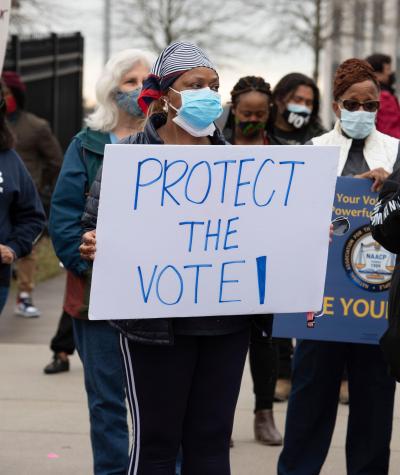Campaign Legal Center (CLC) is representing a coalition of civic participation groups that filed a lawsuit on April 7, 2021 in federal district court in Georgia to block a new state law, S.B. 202, which, among many other problems, restricts the distribution of vote-by-mail applications to voters.
VoteAmerica, the Voter Participation Center and the Center for Voter Information, the plaintiffs in this lawsuit, are three nonprofit organizations that distribute vote-by-mail applications to voters in the state of Georgia.
The suit challenges Georgia’s S.B. 202 as violating those organizations’ First Amendment right to distribute vote-by-mail applications as core political speech.
In March 2021, the Georgia General Assembly passed S.B. 202, an omnibus bill that made numerous changes to Georgia’s election system that, among other things, denies those who need assistance their freedom to vote.
These changes to Georgia’s election code prohibit the Secretary of State, county election officials and other government officials from sending vote-by-mail applications directly to any voter unless the voter specifically requests one.
The law prohibits anyone from aiding a voter by prefilling a voter’s information in a vote-by-mail application—a critical tool for many online voter assistance platforms.
Furthermore, the law imposes a $100 fine for every application sent by an organization to a person who has already requested, received or voted using an absentee ballot—a major financial disincentive for nonprofit groups trying to aid with getting absentee ballot applications to registered voters.
Many Georgia voters rely on third party groups to provide them with prefilled and preprinted absentee ballot applications that they can easily review and submit to their county elections official without the need for a broadband internet connection or access to a printer or scanner at home.
This was particularly true during the COVID-19 pandemic in the 2020/2021 election cycle, but remains the case for voters in rural areas, young voters and voters of color who often disproportionately lack the means or opportunity to obtain and prepare absentee ballot applications on their own.
S.B. 202 threatens to put up barriers to silence Georgia voters by limiting core political speech protected by the First Amendment. This bill should not be used to bypass the will of voters across the state by ignoring the successes of the 2020/2021 elections and the objections of national organizations and civil rights groups.
Georgia’s recent election experience demonstrated the overwhelming support for election laws that allow voters to cast their ballots safely and freely, whether they live in a small town or big city, so that every voice is heard and elections in the state reflect the will of the voters.
